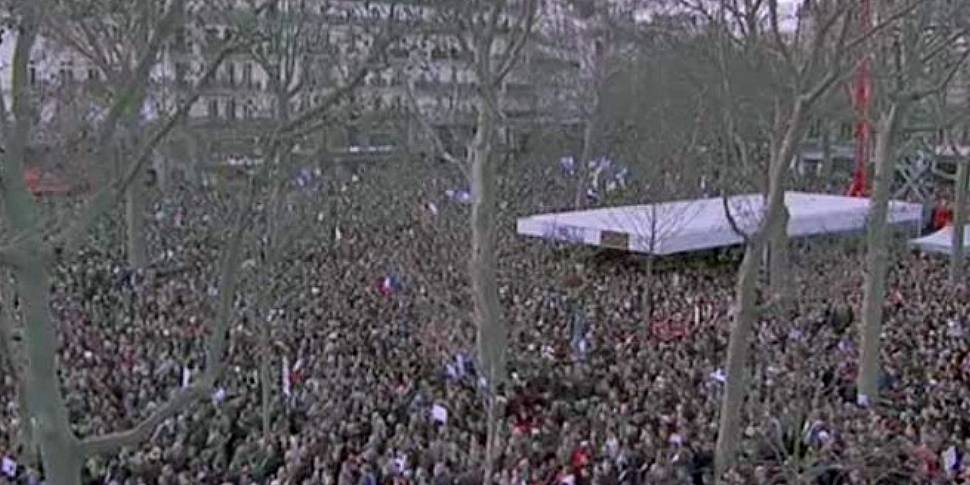More than a million people have marched through Paris in a show of defiance and unity in the wake of three days of terror that left 17 people dead.
Officials say the rally was the largest demonstration in French history. In total, more than three million people took part in anti-extremism rallies across France.
The capital was on high alert as the crowd made its way from the historic Place de la Republique to Place de la Nation.
The families of those who died in the shootings, many of them weeping and embracing, led the march alongside heads of state and royalty.
World leaders linked hands as they set off on the 1.9 mile route.
Among those at the head of the crowd were Taoiseach Enda Kenny, French President Francois Hollande, German Chancellor Angela Merkel and British Prime Minister David Cameron.
Yesterday, Mr Kenny said: "Today we march to show that Liberte, Egalite, Fraternity are written, not alone on the history and monuments of the Fifth Republic but in the hearts and minds of the people of France and our European Union."
"Voltaire wrote that 'tolerance is the consequence of our humanity'."
"We march here in his city to defend that tolerance and humanity against the hatred and extremism that would dismantle and destroy them."
In our solidarity we show the agents of such destruction that to us their actions are anathema, their propositions absurd," he added.
Before they set off, a minute of silence was observed for those who died in the attacks.
Many of those marching carried the French national flag and tributes to the victims of the attacks on a satirical magazine, a Jewish supermarket and police.
Occasional bursts of applause and chants of "Charlie! Charlie!" in memory of the journalists gunned down at Charlie Hebdo on Wednesday could be heard from the crowds.
Small groups sang the La Marseillaise, the French national anthem. Giant letters attached to a statue in the Place de la Republique spelt out the word "Pourquoi?" (Why?).
"Today, Paris is the capital of the world"
More than 5,500 police and military personnel were deployed, including 2,200 who guarded the route of the march.
Some 2,000 police officers and 1,350 soldiers were stationed at other locations around the city, including at places of worship, media outlets and public buildings.
A total of 150 plain clothes detectives mingled among the crowd and a security perimeter was enforced, with roads and some metro stations closed.
Nearly 10,000 people took to the streets of Dammartin-en-Goele, the small town where the manhunt for the brothers behind the Charlie Hebdo attack came to a bloody end.
In Saint-Etienne in the southeast, some 60,000 people, more than a third of the population, joined a march from the railway station to the town hall.
The scenes were repeated everywhere from Perpignan in the Pyrenees of the south to Blois in the Loire valley.
Ahead of the Paris rally, French President Francois Hollande said: "Today, Paris is the capital of the world."
"Our entire country will rise up toward something better."
Brothers Cherif and Said Kouachi, who were behind the attack on Charlie Hebdo, and their associate Amedy Coulibaly, who shot dead a policewoman and then killed four people at the kosher supermarket, were killed by police on Friday.
Authorities are hunting Coulibaly's "armed and dangerous" partner Hayat Boumeddiene.
Attention is now turning to international security, with the US holding a summit next month on how to fight violent extremism around the world.
Noel Canty is a reporter for French channel TV5 Monde. He has described the scene in Paris today - and also says that French border control will almost certainly be tightened.
John Lichfield, London Independent’s Paris Correspondent, spoke to Pat Kenny this morning about the current mood in Paris and the turnout at the march yesterday.
He stated: "There is a lot worth defending in this country, not just this country but the way we live in the West."
Here is his interview in full:
Originally posted at 14.20, 11/01/2015









